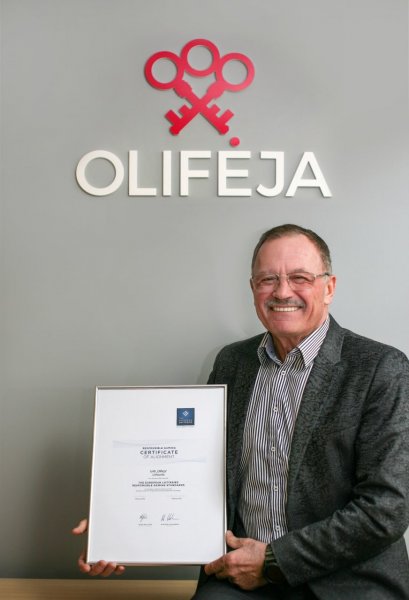
Olifėja, Lithuania’s biggest lottery operator, became the first in the country to be certified as meeting Responsible Gaming Standards by the European Lotteries after an assessment of the company’s lottery operations. Responsible Gaming Standards aim, through prevention and education, to ensure the safety of lottery participants and vulnerable groups in society and to clearly explain to participants the rules of play and role of chance in the game.
To obtain this certification, Olifėja worked for several years to implement the required standards, and was then audited, starting last September, by PwC, an international audit company. PwC examined 10 aspects of the company’s activities, and the results were assessed by the European Lotteries.
The basis of the standards are transparency of operations and the proper informing of lottery participants. Players must know that lotteries are a form of entertainment and a game of chance, so it is a duty of lottery operators to present all the rules clearly. The standards also aim at the protection of children.
“There’s agreement at the European level that the most important thing for ensuring that lotteries are beneficial for society is self-regulation. We ourselves feel responsible for the games we run. We want lotteries to be fun entertainment. Compared to other European countries, Lithuanians aren’t so prone to games of chance and we have room to grow, but we have to make sure that we don’t grow at the expense of vulnerable groups in society,” said Antanas Muraška, the CEO of Olifėja.
He said the biggest challenge in implementing the standards was finding doctors and psychologists who work with people who feel addicted to lotteries. “Happily or unhappily, but we couldn’t find specialists here who had dealt with people who were addicted to lotteries. Still, we’re ready to ensure players get help whenever that’s needed. As an example, at the points of sale we provide information to lottery participants about where they can go for help if they ever need it,” Mr Muraška said.
Olifėja’s activities and lottery processes were assessed in terms of these 10 aspects:
Olifėja continues to improve the responsible gaming measures it has implemented, involving in this process market regulators, healthcare professionals and society. It does so seeking to ensure that lotteries are always of benefit to society and serve as an enjoyable form of entertainment.
The European Lotteries is the leading European Association for state-owned and state-licensed lotteries. It works closely with European Union institutions to implement common operating standards. It currently unites 73 lottery operators in 43 countries. The association was founded in 1983 in Switzerland. In 2007 it set up an office to EU institutions in Brussels. It adopted the Responsible Gaming Standards in 2007, and in 2009 approved a framework for the certification of lottery operators. These arrangements are regularly reviewed and updated to reflect the latest research results and any changes in the legal environment.
Olifėja has been organising lotteries in Lithuania for 25 years. For every lottery ticket sold, 8 percent of the proceeds go to sponsor sporting activities and the training of Lithuania’s Olympic athletes. Since its creation, the company has provided more than 63 million euros for that purpose.